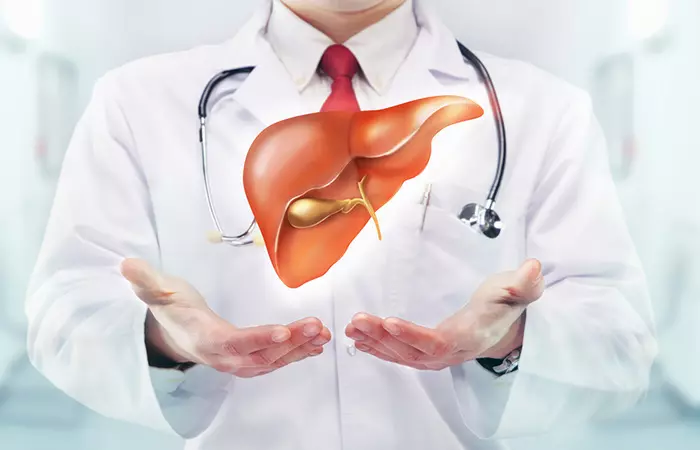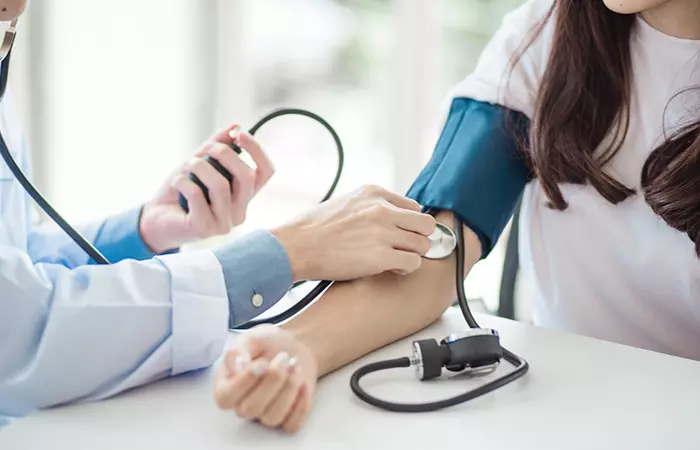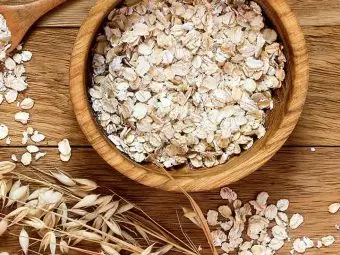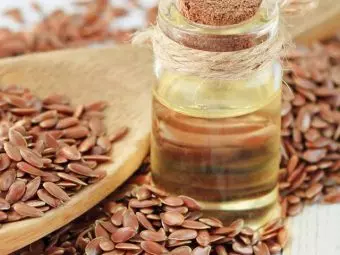The side effects of fat burners are pretty dire and scientifically proven. These supplements are aimed at burning fat and helping you lose weight rapidly, but they certainly cause more harm than good. Some of their adverse effects are extremely severe. Shocking, isn’t it? So what are the risks of taking fat burners? How do they actually work? And is there a way to use them safely?
Keep reading to know more!
In This Article
Fat Burners: What Are They?
The term ‘fat burner’ is used to describe nutrition supplements that help you burn fat. Fat burners claim to aid quick weight loss. They increase fat metabolism or energy expenditure rapidly.
They also alter fat absorption or trigger long-term changes to promote fat metabolism. When used during workout sessions, fat burners are supposed to increase fat oxidation (1).
These so-called natural products cause weight loss by either stimulating lipolysis (breakdown of accumulated fat) or inhibiting lipogenesis (synthesis/accumulation of fat) (2).
These supplements contain a variety of ingredients like caffeine, green tea, carnitine, conjugated linoleic acid, chromium, kelp, and fucoxanthin (1).
Let’s check out how a few of these additives work.
Related: How To Lose Weight In 1 Week – Simple Tips To Follow At Home
How Do Fat Burners (Claim To) Work? Are They Safe To Use?
Most of the ingredients in fat burners or diet pills speed up your metabolism. This stimulates the release of some neurotransmitters (like adrenaline and norepinephrine). These neurotransmitters trigger the release of glucose from the liver and the body’s fat reserve (adipose tissue) (3), (4).
Did You Know?Caffeine can temporarily increase energy expenditure or metabolism by 16 percent over 1 to 2 hours (14).
By burning or mobilizing the stored fatty acids, these supplements aim to increase the production of energy (ATP). In other words, they use glucose and fat to produce energy. Therefore, you shed some pounds and get an energy boost as well!
Here’s a list of commonly found ingredients in fat burners (5):
| Ingredient | Proposed Mechanism of Action |
|---|---|
| African mango (Irvingia gabonensis) | Inhibits adipogenesis and reduces leptin levels |
| Beta-glucans | Increase satiety and gastrointestinal transit time, and slow glucose absorption |
| Bitter orange (Citrus aurantium L.) | Increases energy expenditure and lipolysis, acts as a mild appetite suppressant. Synephrine is the proposed active constituent. |
| Caffeine (as added caffeine or from guarana, kola nut, yerba maté, or other herbs) | Stimulates central nervous system, increases thermogenesis and fat oxidation |
| Calcium | Increases lipolysis and fat accumulation, decreases fat absorption |
| Capsaicin and other capsaicinoids | Increase energy expenditure and lipid oxidation, increase satiety, and reduce energy intake |
| Carnitine | Increases fatty acid oxidation |
| Chitosan | Binds dietary fat in the digestive tract |
| Chromium | Increases lean muscle mass; promotes fat loss; and reduces food intake, hunger levels, and fat cravings |
| Coleus forskohlii | Enhances lipolysis and reduces appetite. Forskolin is the proposed active constituent. |
| Conjugated linoleic acid | Increases lipolysis, reduces lipogenesis, and promotes apoptosis in adipose tissue |
| Fucoxanthin | Increases energy expenditure and fatty acid oxidation, suppresses adipocyte differentiation and lipid accumulation |
| Garcinia cambogia (hydroxycitric acid) | Inhibits lipogenesis, suppresses food intake. Hydroxycitric acid is the proposed active constituent. |
| Glucomannan | Increases feelings of satiety and fullness, prolongs gastric emptying time |
| Green coffee bean extract (Coffea arabica, Coffea canephora, Coffea robusta) | Inhibits fat accumulation, modulates glucose metabolism |
| Green tea (Camellia sinensis) and green tea extract | Increases energy expenditure and fat oxidation, reduces lipogenesis and fat absorption |
| Guar gum | Acts as bulking agent in gut, delays gastric emptying, increases feelings of satiety |
| Hoodia (Hoodia gordonii) | Suppresses appetite, reduces food intake |
| Probiotics | Alter gut microbiota, affecting nutrient and energy extraction from food and altering energy expenditure |
| Pyruvate | Increases lipolysis and energy expenditure |
| Raspberry ketone | Alters lipid metabolism |
| Vitamin D | None proposed; associations exist between low vitamin D status and obesity |
| White kidney bean (Phaseolus vulgaris) | Interferes with breakdown and absorption of carbohydrates by acting as a “starch blocker” |
| Yohimbe (Pausinystalia yohimbe) | Has hyperadrenergic effects. Yohimbine is the proposed active constituent. |
The ingredients in fat burners improve your endurance, alertness, memory, feeling of vigor, and reduce fatigue. In a way, they enable you to train longer and harder. All of this to just burn more fat!
Logically and theoretically speaking, this is mind-blowing! But, research shows an entirely different picture.
The secreted neurotransmitters may not always have desired effects. They can increase your heart rate and blood pressure. A few ingredients can cause vasodilation (constricting blood vessels) and expanded airways (4).
Did You Know?The intake of a combination of caffeine and green tea extract was found to help an individual burn 16% more fat than a placebo (15).
Therefore, fat burners can be dangerous for your health. In fact, the scientific community goes to the extent of calling them all bogus!
Do you want to know how they affect your health? Jump to the next section.
Related: How To Get Rid Of Upper Back Fat In 3 Weeks
What Are The Harmful Effects Caused by Fat Burners?
Fat burners are supposed to aid weight loss. Instead, they affect your liver, heart, brain, and appetite. Here’s how and why this happens.
1. Liver Damage

Shutterstock
Despite several claims about the safety of herbal weight loss supplements, researchers have reported multiple episodes of hepatotoxicity. Certain fat burners contain an ingredient called usnic acid. This, along with green tea and guggul tree extracts, has been found to cause liver damage (6).
A healthy 28-year-old woman had acute liver failure within a month of taking 500 mg/day of pure usnic acid for two weeks. Kombucha tea is another herbal supplement that contains usnic acid. It has also been reported to be hepatotoxic (6).
Consuming fat burners with green tea extracts may cause jaundice and acute hepatitis.
Chromium polynicotinate, a common fat burner additive, is reported to cause acute liver injury.
Most such ingredients interact with plant extracts like Garcinia cambogia and heavy metal contaminants to cause liver damage (7).
2. Blood Pressure Fluctuation

Shutterstock
Many of the ingredients found in fat burner pills or powders are legally banned in some countries as they can cause hypertension and fluctuations in blood pressure.
Compounds like phenylpropanolamine (PPA), fenfluramine, caffeine, and ephedrine also cause hypertension (8).
These compounds stimulate your central nervous system (CNS) to control appetite. However, they also adversely affect your blood pressure.
Herbal additives like bitter orange extract (Citrus aurantium) are said to interact with compounds like caffeine and synephrine. They increase your blood pressure or cause fluctuations by constricting blood vessels (1), (5).
3. Anxiety And Headache

Shutterstock
High doses or chronic consumption of weight loss supplements can lead to anxiety. Supplements containing bitter orange extract, caffeine, and yohimbe may give you a headache along with anxiety (5).
Green coffee bean extract too can cause panic attacks. Moreover, fat burners that contain caffeine are too hard on your heart. If you have heart problems, it is recommended you stay away from fat burners and caffeinated supplements (9).
SubscribeRelated: 7 Effective Yoga Poses For Depression You Can Do At Home
4. Heart Attack
Obesity is one of the main risk factors for heart attacks. Taking diet pills, fat burners, or weight loss medication might sound like an easy and quick way out. But, recent studies have proven the lethality of these supplements.
While burning fat, these supplements may affect your cardiovascular health. Fat burners may cause cardiac arrhythmia and even heart attacks.
A (in)famous banned weight loss drug is ephedra. In fact, any supplement containing ephedrine alkaloids are prohibited in the United States (5).
Aspirin is another additive in fat burners. It is added to ensure longer retention of the drug in the bloodstream by lowering the urinary excretion. When combined with caffeine or any over-the-counter blood thinner, aspirin can trigger a heart attack (10).
5. Nausea And Diarrhea

Shutterstock
Many weight control drugs/pills limit your appetite by exerting an anorectic effect on your body. This may lead to nausea and diarrhea (5).
Fat burners stimulate your CNS to delay gastric emptying and induce a feeling of satiety. When you take fat burners that contain guar gum, carnitine, green tea extract, chromium, or chitosan, you may experience nausea and vomiting (5).
What’s worse is that most of them don’t even affect your body weight, let alone aid weight loss!
Related: 13 Effective Home Remedies To Stop Vomiting And Nausea
6. Insomnia

Shutterstock
Green coffee bean extract and other caffeine-rich supplements are said to control your blood glucose levels.
The active ingredient in it, chlorogenic acid, along with caffeine, is supposed to slow down your body’s absorption of glucose. Indirectly, this is supposed to promote weight loss (11).
However, research has found this effect only in a few individuals. In most people, these active compounds cause insomnia and increased heart rate. Sleeplessness is again linked to obesity and weight gain (12).
In other words, you will neither lose weight nor have a good night’s sleep.
So, now you know that fat burners are just a bunch of lies!
Most of the literature available today tells you not to use these drugs/supplements. There is probably just a tiny fraction of people that benefit from them.
How do the rest of us lose weight then? What’s a safer way to lose weight? Read on to find out!
How To Prevent The Side Effects Of Fat Burners And Safely Lose Weight
Yes, it is true. Obesity is a growing menace around the world. Hence, it comes as no surprise that almost anything in the name of weight loss sells today. Every other person wants or needs to lose weight! And in an effort to do so, many of them fall for the concept of “quick weight loss.” Fat burners are a fad born out of this concept.
But, we have already told you about the repercussions of weight loss supplements. We have almost forgotten the idea of healthy weight loss!
Remember (13):
- Healthy weight loss always takes time.
- Both your body and your mind need to be controlled. Yoga, meditation, and mindful/ clean eating are some tools you can use along with other weight loss interventions to do.
- Count your nutrients too – not just your calories.
- Stick to the said limit. Do not exploit/overconsume these substances.
- ‘Natural’ does NOT ALWAYS mean ‘safe.’
- Talk to a nutritionist. Self-medication can be fatal.
Caution!
- If you are diagnosed with a cardiovascular disease, diabetes, or anorexia, stay away from these supplements. Consult your doctor for instructions to use if any.
- The safety of fat burners in pregnant and nursing women has not been studied. It is better to avoid their usage.
- Do not use fat burners or any such supplements without medical consent/guidance..
Fat burners are nutrition supplements that help burn fat. They improve your energy expenditure and fat metabolism and lead to weight loss. They also may reduce fatigue and improve your endurance. However, you also must be aware of the side effects of fat burners. Excess intake of fat burners may cause liver damage, fluctuations in blood pressure, anxiety, headaches, heart attack, insomnia, and nausea. If you experience any adverse effects, discontinue use. Also, consult your doctor regarding the dosage of these supplements.
Frequently Asked Questions
How much weight can you lose with fat burners?
There is no specified amount of weight loss that can be guaranteed with fat burners. It varies from person to person, physical activity level, and food habits. However, fat burners can accelerate fat loss.
Do fat burners help lose belly fat?
No, fat burners cannot target any specific area of the body for fat loss. Follow a healthy diet and a regular exercise routine to lose belly fat.
How long does it take for fat burners to work?
Depending on the ingredients, fat burners start working 10-45 minutes after ingestion.
References
- “Fat burners: nutrition supplements that increase fat metabolism.” Obesity Reviews, US National Library of Medicine.
- “Risks associated with fat burners: A toxicological perspective.” Food and Chemical Toxicology, US National Library of Medicine.
- “Facts About Fat Burners” Weight Loss, International Sports Sciences Association.
- “Fat burners: nutrition supplements that increase fat metabolism“, Obesity Reviews, Wiley Online Library.
- “Dietary Supplements for Weight Loss” Health Information, Office of Dietary Supplements, National Institutes of Health.
- “Acute liver failure caused by ‘fat burners’ and dietary…” Canadian Journal of Gastroenterology, US National Library of Medicine.
- “Hepatotoxicity Due to Hydroxycut: A Case Series” Liver, Original Contributions, The American Journal of Gastroenterology, The American College of Gastroenterology.
- “Toxicity of Weight Loss Agents” Journal of Medical Toxicology, US National Library of Medicine.
- “Green coffee caution” MSU Extension, Michigan State University.
- “Diet Pills: Fat-Burning or Risk-Taking?” CU Sports Medicine, Information for Patients and Families, University of Colorado Hospital.
- “Claim vs. Truth: Do Weight-Loss Supplements Really Work?” Get-U-Fit Blog, Warhawk Fitness & Aquatics, University of Wisconsin Whitewater.
- “The link between sleep deprivation and weight gain” Evidence-based Living, Cornell University.
- “Weight Control” National Center for Complementary and Integrative Health, National Institutes of Health.
Was this article helpful?
Related
The following two tabs change content below.
- Reviewer
- Author
Swathi Handoo
Swathi holds a master’s degree in biotechnology from Osmania University and has worked in places where actual science and research… more
Temple Stewart
(RD, LDN)Temple Stewart is a Registered Dietitian Nutritionist and Personal Trainer in St. Petersburg, FL. She sees clients all over the… more



 23 Amazing Benefits Of Mulberries (Shahtoot) For Skin, Hair, And Health
23 Amazing Benefits Of Mulberries (Shahtoot) For Skin, Hair, And Health 22 Best Benefits Of Oatmeal For Skin, Hair, And Health
22 Best Benefits Of Oatmeal For Skin, Hair, And Health 21 Amazing Benefits Of Litchis (Lychees) For Skin, Hair, And Health
21 Amazing Benefits Of Litchis (Lychees) For Skin, Hair, And Health 10 Nutritional Benefits Of Carrot Juice For Skin, Vision, And Health
10 Nutritional Benefits Of Carrot Juice For Skin, Vision, And Health Honey For Oily Skin – 12 Best Ways To Use It Effectively
Honey For Oily Skin – 12 Best Ways To Use It Effectively Flax Seeds Benefits & DIY Face Masks For Beautiful Skin
Flax Seeds Benefits & DIY Face Masks For Beautiful Skin Parsley: 10 Potential Benefits And Uses, Nutrition, How To Make Tea
Parsley: 10 Potential Benefits And Uses, Nutrition, How To Make Tea 33 Wonderful Benefits Of Banana For Skin, Hair, And Health
33 Wonderful Benefits Of Banana For Skin, Hair, And Health Tea Tree Oil For Warts: Benefits, How To Use, And More
Tea Tree Oil For Warts: Benefits, How To Use, And More